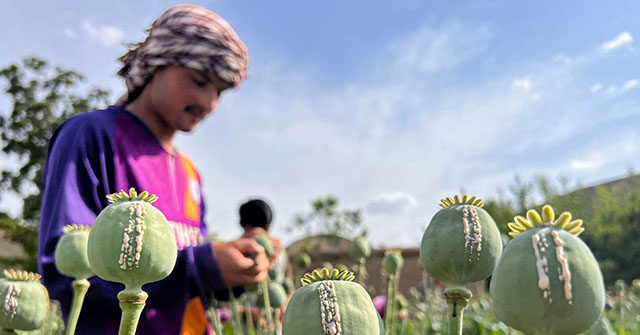The United Nations Office on Drugs and Crime (UNODC) issued a report Thursday that found the amount of land used to cultivate opium poppies in Afghanistan has decreased by 20 percent over the past year.
“The total area under opium poppy cultivation in 2025 was estimated at 10,200 hectares, 20 per cent lower than in 2024 (12,800 hectares) and a fraction of the pre-ban levels recorded in 2022, when an estimated 232,000 hectares were cultivated nationwide,” UNODC said.
“Accordingly, opium production has also declined in 2025, at a rate even greater than that of cultivation, dropping by 32 per cent compared to 2024, to an estimated total of 296 tons,” the report continued.
The decline in 2025 followed a 19-percent increase in opium harvesting in 2024, an increase UNODC attributed to “economic hardship” as desperate farmers flouted the Taliban decree, egged on by heroin traffickers eager to replenish their inventories. Also, opium harvesting shifted dramatically from southwestern Afghanistan to the northeast, contributing to the spike in production.
On the other hand, opium prices have skyrocketed since Taliban Supreme Leader Haibatullah Akhunzada issued a decree banning opium poppy cultivation in April 2022. UNODC found the price of dry opium down by 27 percent last year, but it remains five times higher than it was before the ban, suggesting that more income can be generated with less farmland.
At current prices, 10,200 hectares of poppies can yield a tidy profit – and even the annual reductions reported by UNODC are far from opium production being “banned” or eliminated by the Taliban, as the Islamist extremists promised when they seized power in 2021. Opium production declined sharply in the year following the ban, but it had a long way to fall – before the Taliban takeover, Afghanistan was producing over 80 percent of the world’s opium.
U.N. analysts said the drop in both yield and prices from Afghanistan suggested a good deal of opium production has been moved across the border. Many opium farmers have reportedly relocated to the Balochistan region of Pakistan, as they did when the previous Taliban regime banned opium harvesting in 2000.
U.N. officials worried about the hardships inflicted on impoverished opium farmers by the poppy ban, as they struggled to grow any other profitable crops and the Taliban’s promised assistance to farmers has been slow to materialize.
Some of the Afghans who used to make a living by cultivating opium poppies have switched to manufacturing synthetic drugs, including methamphetamines, which is not the outcome hoped for by international law enforcement officials.
“Afghanistan’s path to overcoming illicit crop cultivation requires coordinated, long-term investments, including through international partnerships. It is about placing equal emphasis on empowering Afghan farmers through alternative income-generating activities, eradicating illicit crops and countering drug trafficking, while reducing demand through enhanced prevention and treatment,” said Oliver Stolpe, UNODC’s regional representative for Afghanistan, Central Asia, Iran, and Pakistan.
This proposed solution will clash with the general reluctance of the international community to pour more money into Taliban-dominated Afghanistan, given the horrific human rights record of the regime, and concerns that the Taliban will steal a good deal of any humanitarian aid funding.
The U.N. itself is finding the moral hazard of supporting the Taliban regime, by feeding its captive population, is growing difficult to overcome. The United Nations Assistance Mission in Afghanistan (UNAMA) announced on Thursday it has suspended services for returning migrants at the Islam Qala border in Herat province because the Taliban will not allow female staffers to work for the operation, and the majority of the returnees are woman and children.
“Without female staff, we cannot collectively serve returning women and children under conditions of dignity and respect,” UNAMA said.


















